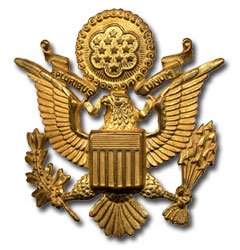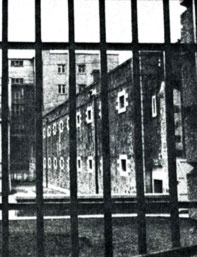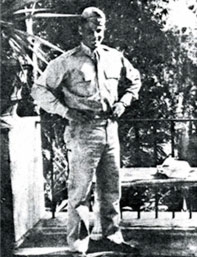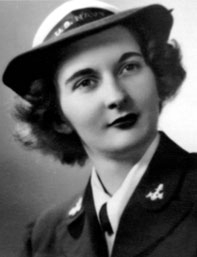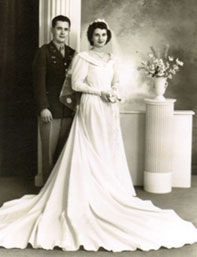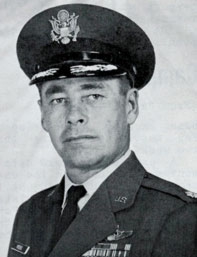Bail-out over Jersey Island
On the pretext of collecting laundry, Belza Turner was able to visit the American on a few more occasions including his 23rd birthday on 12 February when she took him a birthday cake. Not, admittedly, the same as we would expect today as the necessary ingredients were missing but it was food and the cake made his 23rd his most memorable birthday!
Shortly afterwards his German captors informed Lt. Krebs that he would soon be moved to France but before his departure, and as a token of his appreciation, he gave Belza his Army Air Corps class ring (which she was to return to him 20 years later) as well as his flying scarf, this being a piece of 6ft. x 3ft. white silk.
Although the 354th Mustang Group had the most aerial combat victories, as well as having destroyed many enemy aircraft on the ground, Lt. Krebs realised that now the tables were turned and on this occasion he was to be the loser.
To France
Fortified with sandwiches and clothing which had been given to him by certain islanders, although short themselves, Lt. Krebs, escorted by a Major and three N.C.Os boarded the troopship SS La France for the trip to St. Malo on 15 February, 1944. Crowded on the foredeck were over 50 civilians (probably OT workers returning to France) but Lt. Krebs and his escort enjoyed the rare luxury of a cabin. Upon arrival at St. Malo, all was confusion as the Allies had just carried out a number of successful bombing runs and in the chaos Lt. Krebs managed to elude his escort for a short while but his injuries did not permit him to maintain his short lived freedom.
A commandeered car took the prisoner and his escort to the railway station from whence he was taken by train to Paris where he was confined in a large prison for seven days before going on to Dulag Luft III near Frankfurt for three weeks of interrogation.
There were swift exchanges of questions and answers between Lt. Krebs and the islanders... "Was the island in enemy or Allied control?"… "Would escape be possible?"... "How was the war going?" and so on.
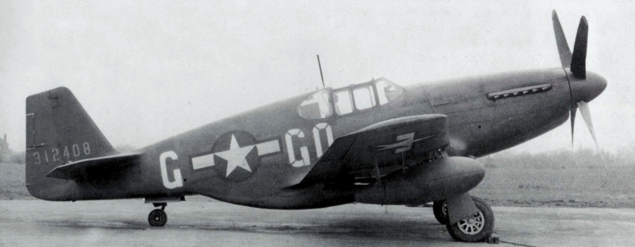
The Germans had a particular interest in America's long-range fighter. The P-51B Mustang shown here is assigned to the 355th Fighter Squadron, photograph at Boxted.
The Germans had a particular interest in Lt. Krebs as he had been flying a Mustang P 51B, one of the very few aircraft that fought in World War II that had been designed after the conflict had begun. The first P 51B flew on 30 November, 1942, and as for Lt. Krebs himself, he had been scheduled to take part in test flights of the then newly developed jet aircraft.
Following his period of intensive interrogation, Lt. Krebs was then transferred to Stalag Luft I at Barth, near the Baltic Sea in North Germany. Travelling in a freight car with about 50 other P.O.W. airmen, the American remained at this camp with about eleven thousand other Allied air force officers until the camp was liberated by the Russians in 1945. "Liberated" is perhaps a misnomer as they all had to remain in the camp under Russian guard for a further two weeks before being flown to Camp "Lucky Strike" near Le Havre, France, where all newly released American p.o.ws received food, clothing and medical attention.
When captured Lt. Krebs had weighed 160 lbs, but at the time of his release he had gone down to just 90 lbs.
Escape Attempt
When Belza Turner visited Lt. Krebs in Gloucester Street prison, little did she imagine that she herself would become an inmate of the building within seven months!
The hoped for liberation of the Channel Islands with the invasion of France on 6 June, 1944, had not been realised and, with the adjacent French coast firmly in the hands of the Americans by September, of the same year, Jersey was well and truly under siege.
With this prevailing situation, and the nearest point on the French coast but 15 miles away, it was inevitable that some local inhabitants would attempt to escape by small boat. Some succeeded but there were also several failures, some of which ended in tragedy.
Belza Turner was one of those who decided quite early on to make the attempt in the company of a young Dutch seaman who had been working on the barges which had, until recently, been plying between the Islands and France but were now laid up in St. Helier Harbour. The attempt was fixed for 16 September, 1944, and the Dutchman, by name Siebe Koster, with access to the harbour, was able to remove a rubber dinghy from one of the boats laid up there.
Belza met Siebe at 6.30 p.m. on the appointed day on the beach at Havre des Pas from where the escape was planned to start. Why Havre des Pas was chosen is somewhat mystifying as this spot is by no means the closest point to France but additionally the rocks and currents would make any journey in a small boat hazardous enough even under normal conditions.
Nevertheless the attempt was made and it is amusing to recall that some Germans swimming in the pool at Havre des Pas waved to them no doubt thinking that the bearded and fairheaded Siebe was one of their comrades taking his girl friend for a row.
Expecting to make the trip in a matter of hours they rashly took no extra food with them and it was not long before they were in the open sea; but with changing winds and currents, and even though they tried to use Krebs' flying scarf as a sail, were soon off course and lost. Cold and hungry, and drifting to and fro in the winds and currents, they eventually reached land — not France, as they had hoped but La Corbiere, Jersey, where German soldiers and the Field Police were waiting for them on the rocks. The date of 19 September is hardly one that either of them are likely to forget!
Both were taken to the Gloucester Street prison where they were kept in solitary confinement for 14 weeks until their trial on 19 December when they were sentenced to be held in prison for the duration of the war.
Whilst exercising in the prison yard on Christmas Eve, 1944. Belza heard someone singing "Lullaby of Broadway" in his cell. She called out to the voice who replied (they could not see each other) and said that he was an American from New York, and when Belza told him she was a Canadian he replied "I guess that makes us cousins". Belza chatted with the prisoner and promised to share her Christmas dinner (or what passed for Christmas dinner in those days!) if she could return to the yard.
As a political prisoner, Belza was able to receive food from outside and her mother was able to send in a cooked rabbit and some vegetables. Beiza wrapped up a share for the unknown "Voice"' who threw a length of string down from his cell window and was thus able to haul up his share.
The weather turned cold and wet after this episode and Belza was not able to go outside for a week or so and when she did manage some exercise the "Voice" had gone. It was not until 1985 in fact, when reading the article entitled "British and American P.O.W.s in Jersey" published in the 1983 edition of the C.I. Occupation Review, that Belza realised that the "Voice" was that of Lt. George Haas who attempted to escape from the P.O.W. Camp at South Hill (hence his incarceration in Gloucester Street) but eventually escaped successfully to France in January, 1945.
Belza was eventually released from prison on 30 April, 1945, nine days before the liberation of Jersey.
Post War
Upon his return to the United States in 1945, Lt. Krebs married Miss Rosemary Schmit, the girl he had met in 1941 when she was serving in the W.A.V.E.S., the American equivalent of the Wrens.
Meanwhile Belza joined the Field Ambulance Nursing Yeomanry (F.A.N.Y.) and took her training at Chickley Hall, before being stationed in London. She returned to Canada in 1946, later marrying Reginald Greene of Montreal.
Lt. Krebs kept in touch through his aunt, Mrs. McQueen, and in 1963 Belza and her family move to Toronto and it was here that the Army Air Corps class ring was returned. Joseph Krebs had stayed on in the Air Force and was soon promoted to Major. During the spring of 1964 he had flown up to Canada for a training weekend with the 440th Troop Carrier Wing at General Mitchell Field at Peterborough, 80 miles from Toronto. It was during a weekend break that he drove over to see Belza and it was then that the ring was returned to its rightful owner.
Joseph Krebs finally retired in 1971 with the rank of Lt. Colonel, the father of three sons and two daughters and, at the time of writing, had just celebrated his Ruby wedding while enjoying a life of leisure, fishing and golfing.

